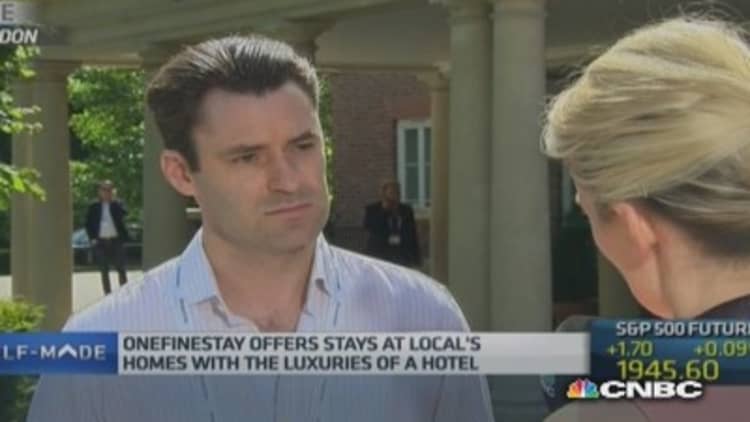Cities across Europe ground to a halt on Wednesday as cab drivers went on strike because of an app started just five years ago which threatens to shake up the world's taxi industry.
Uber is a prominent example of a disruptive start-up and earlier this month the company, which enables riders to order cars with the touch of a button, raised $1.2 billion in funding.
And at the Founders Forum of global CEOs, entrepreneurs and investors, in London on Thursday, the consensus was that disruptive start-ups are here to stay.
"In this environment, talking to entrepreneurs and investors, disruption is the first word on the slide. It represents the possibility of creating something new and exciting—and potentially very valuable," Greg Marsh, co-founder and CEO of onefinestay, told CNBC.

His company certainly has the potential to be disruptive. Branding itself as the "unhotel", onefinestay is similar to an upmarket Airbnb, enabling people to stay in others' apartments when they're out of town.
"On the margin we are displacing some guests who would otherwise stay in high-end hotels," he told CNBC, but stressed that the company wasn't aiming to kill the hotel industry.
"I don't envisage a world where there are no hotels. Instead, a new sector is emerging," Marsh added.
Neelie Kroes, vice president of the European Commission and in charge of its digital agenda, insisted Uber's technology was as disruptive as the strikers feared.
"The customer, the client, should be central in the process. At the end of the day, the client will make up their mind one way oranother. It's competition," she told CNBC at the Founders Forum.
For Michael Acton Smith, CEO and founder of Mind Candy, which is behind the Moshi Monsters phenomenon, disruption has the potential to change the status quo.
"What's wonderful about disruptive businesses like Uber and many others is they make things better for the consumer," he told CNBC. "They push the world forward, even if there are entrenched, established industries that are fighting against it. Because they haven't moved forward and they're paying the price."
He stressed the importance of established players not getting left behind.
"Protesting is only useful in the short term. The smartest way is to disrupt yourself. The world is moving so quickly now, if you rest on your laurels, you will be disrupted," he added.

Working with the big boys
One way that larger corporations are trying to stay ahead of the game is by working closely with start-ups—even those with the potential to disrupt them.
Kathryn Parsons, co-founder and co-CEO of digital workshop provider Decoded, said there was a "huge transformation" taking place.
"Big companies are realizing that to innovate, they need to collaborate. They see that they can't fight or ignore start-ups, because they could disrupt their whole business model," Parsons told CNBC.
Barclays, for instance, has opened Accelerator in east London—a 15-week development program for start-ups, and it's not the only one. Disney, Deutsche Telekom, Microsoft and Nike are among the corporate giants looking to find the next game-changing start-up.
"It's definitely a reaction to disruption. They're getting over the fear. They're realizing there's no point burying their heads in the sand," Parsons added.
Read MoreHigh rent drives London's start-ups south
Businesses are also becoming more interested in technology, and coding in particular, according to Parsons. Her company Decoded has worked with the likes ofLloyds Banking Group, Google, WPP and O2.
"Coding and technology is affecting every aspect of business. So if companies want to exist is three years' time, they need to understand this," she told CNBC. "They need to evolve; become nimble and quick and behave much more like a start-up."
Continually disruptive?
There's no guarantee that a company which was disruptive once will continue to be so, Mind Candy's Acton Smith added.
"We were very disruptive a few years ago, and unless we can crack mobile, we will be one of those companies that the new start-ups are taking on," he said.
"Disruptive companies are only here to stay as long as they remain disruptive and provide something new and exciting for the consumer.


